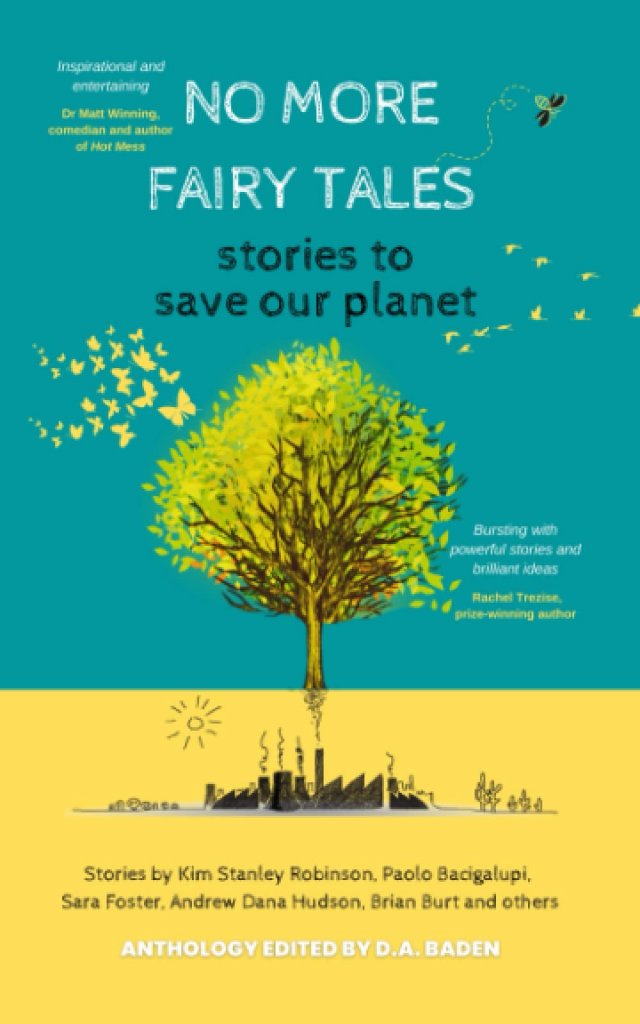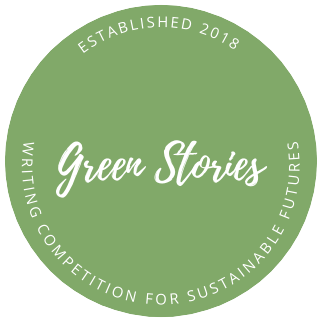
Now that you have finished reading The Award Ceremony by D.A. Baden, it’s time to turn the story into reality? All the solutions proposed in our COP27 Anthology are realistic, they have been verified by experts in their field but they will require financial investment, policy changes, research and/or time to become reality and/or scale up. IF we start acting now, we can make it happen. This page is designed to give you the tools and information you need to get started on implementing the solutions presented in the story. The power to save our planet is in your hands, will you use it wisely?
Navigation
- Solution 1: Moving away from GDP to the Wellbeing Index
- Solution 2: Switching to sharing economy
- Solution 3: Female empowerment to address overpopulation
- Solution 4: Culture
- Find out more about the author: D.A. Baden
- What can you do to progress these ideas further?
Solutions
The solutions presented in this story (female empowerment, reducing consumption and moving away from GDP to a well-being index) were rated the most impactful climate change solutions in the book ‘39 ways to save the planet’. The Award Ceremony raises awareness of these solutions, but how do we implement them? We’ve compiled the below resources to help you progress the ideas further.
Solution 1: Moving away from GDP to the Wellbeing Index
You’ll remember how at the end of The Awards Ceremony, the story went full circle and the professor receiving the award was being criticised by the protestors for his views on GDP. Whilst in most countries, Gross Domestic Product is the way we currently measure economic success, it doesn’t have to be the only way. In fact, it’s disastrous for our planet if we continue to only look at GDP as our only measure of success.
We hope this bank of resources will help to educate you on this solution and give you a starting point for a discussion on how to make it a reality. Perhaps your country could be the pioneer in how we measure economic success?
The idea is to replace the GDP index which measures our Gross Domestic Product with a Well-Being Index (aka Happy Planet Index etc.). Some say that when governments are judged on metrics like the GDP, which are based on consumption this does little to promote more sustainable policies that benefit people. For example GDP increases when there are disasters as more resources are used. It is argued that measuring well-being instead would allow governments to be judged on broader criteria which will lead to more sustainable policies.
Read More
Resource 1: the BBC Sounds episode on the Happiness Index (or well-being index)
“How well is your country doing? The GDP – gross domestic product – has long been a measure of growth and success but some argue judging purely on economics is too narrow-sighted. Tom Heap meets ‘chopsy’ Sophie Howe, the Future Generations Commissioner for Wales who will challenge if a decision being made will be detrimental for children and those yet to be born. If the cost and inheritance to them is high it risks getting kicked out. She takes him to the wetlands she helped save from a planned M4 development. Katherine Trebeck explains alternatives measures of national success, the factors they take in and why many feel happier about using them. Dr Tamsin Edwards assesses what an alternative viewpoint could do for carbon cutting.”
Resource 2: David Cameron’s article in The Guardian talking about the Happiness Index
In the article the ex Prime Minister said: “It’s time we admitted that there’s more to life than money and it’s time we focused not just on GDP but on GWB – general wellbeing.”
There is also a great article that discusses the revolutionary impact of switching our metrics from GDP to well-being in positive news.
Resource 3: Videos on the Happy Planet Index
Resource 4: Useful links for further reading
- OECD Better Life Index
- Sustainable Society Foundation Report on “measuring wellbeing and progress towards sustainability”, read here.
- Read about how the convenience store chain the Cooperative have been using the Wellbeing Index to measure success here.
- This article looks at how the concept of economic growth as something to aspire to is being challenged.
This is a work in progress and with input from experts, we will populate each column as we go for each solution.
Have suggestions you’d like us to include in the table? Email us at greenstories@soton.ac.uk
| Actions for policy makers (e.g. central/local government | tba |
| Actions for public | Join campaign. Write to your local authority/MP asking them to support moving away from GDP to well being index. Find your government representative or Member of Parliament and email them, whether you are in Australia; Canada; UK; USA or elsewhere. Email news programmes to ask them to report more social/environmental metrics (good and bad) not just consumption (as that assumes consumption is good). |
Read Less
Solution 2: Switching to the sharing economy
Think of all the stuff in your shed, or your attic, or at the back of your cupboard. Your house is probably full of items that you may only use once or twice a year, but is still taking up lots of space and you want to keep in case you need it. Think of all the resources and expense in every household having a drill for example, or large suitcases, bikes etc. Wouldn’t it be more efficient and save a lot of space and resources if we could easily just borrow stuff we only need now and then? What about an Amazon of borrowing rather than buying? Libraries of Things in every neighbourhood? Could the next John Lewis Christmas ad: be ‘Buy a year’s membership to sports department or fashion department for your friends and relatives?’
In The Award Ceremony you may remember the extract that mentions the countless sharing apps such as Mother Share instead of Mother Care, but did you know that solutions like this exist NOW? We simply need more of them and for them to be better adopted. How do we get there? Through policy changes that will incentivise businesses to make the switch to the sharing economy.
Read More
Resource 1: Rachel Botsman TED talk on the case for collaborative consumption (sharing economy)
Resource 2: Article about the Olio borrowing app
Resource 3: Academic articles on the sharing economy
Baden, D., Peattie, K., & Oke, A. (2020). Access over ownership: case studies of Libraries of Things. Sustainability, 12(17), [7180]. DOI: 10.3390/su12177180
Baden, D., & Frei, R. (2022). Product Returns: An Opportunity to Shift towards an Access-Based Economy?. Sustainability, 14(1), 410.
Abstract: Over the last decade there has been increasing interest in the concept of the sharing economy, which replaces the focus on individual ownership with a focus on access to goods and services through borrowing, hiring or sharing. This study investigates the efficacy of extending the library concept to include more items, such as those that are used infrequently. The aim is to explore how Libraries of Things (LoTs) operate and the potential to broaden their appeal, reach and sustainability. This study adopts a multiple case study method to provide a snapshot of six LoTs in the UK. Findings indicate that all LoTs shared common environmental and social values, with the most prevalent values being to use the library concept to reduce resource use and waste and to enable more equitable access to goods. All relied on volunteers and public support, in the form of free or discounted space and none were yet economically self-sufficient. This poses important questions about the future for LoTs and whether they could or even should, transition towards the mainstream to make a more substantive contribution to creating a more socially equitable and environmentally sustainable economy.
In terms of environmental benefits, Library of Things London calculated that each year their activities save 11 tonnes of waste from going to landfill and 60 tonnes of CO2. They also anticipate indirect benefits through stimulating wider behaviour and systems change (e.g. amongst manufacturers, retailers, policymakers) resulting from thousands of people being incentivised to borrow rather than buy. Also, the local re-use and repair economy is stimulated by this activity, for example, 60% of borrowers surveyed said they were now 60% more likely to recycle and repair items. This suggests that engagement with an LoT could prompt users into the types of pro-sustainability behavioural “spill-overs”
For example, a study by Skjelvik et al., (2017) found that drills are typically used only 18 minutes per year and emissions from their use are just two percent of the total emissions, the rest coming from their manufacture, distribution and disposal. Five drills each rented six times instead of 30 drills being purchased would save an estimated 700 kg CO2e. The manufacture and transport of goods also gives rise to environmental issues such as deforestation, loss of habitat, loss of biodiversity, pollution, congestion and toxic waste (Castellani et al., 2019).
Castellani, V., A. Beylot and S. Sala: 2019, ‘Environmental impacts of household consumption in Europe: Comparing process-based LCA and environmentally extended input-output analysis’, Journal of Cleaner Production 240 117966.
Skjelvik, J. M., A. M. Erlandsen and O. Haavardsholm: 2017. ‘Environmental impacts and potential of the sharing economy’, (Nordic Council of Ministers). Read the book here.
What can you do to progress these ideas further?
This is a work in progress and with input from experts, we will populate each column as we go for each solution.
Have suggestions you’d like us to include in the table? Email us at greenstories@soton.ac.uk
| Actions for policy makers (e.g. central/local government | Fund libraries of things from tax payers money like book libraries; Make local authority space available at no cost for libraries of things, tax goods rather than labour to incentivise job creation and resource minimisation. |
| Actions for funding bodies | Award grant funding to libraries of things |
| Actions for businesses | Make space available for second hand-preloved goods in storesMake rental/borrowing attractive to consumers e.g. see product returns an opportunity to shift towards the sharing economy.pdf. Use your marketing clout to promote re-use over buy-use-dispose. Manufacture products for quality and long life and easy repair. Examples of a fashio swap/repair hub are here |
| Actions for public | Make use of your local libraries of things, fashion swap apps, rental services, car share services (add links to these – be aware this is an international project). Promote sharing solutions via your social networks. Write to your local authority/MP asking them to support the sharing economy. Write to relevant businesses to ask them to make borrowing/renting more financially attractive |
Read Less
Solution 3: Female Empowerment
COP27 is the 27th year the conference of the parties has taken place but one thing it has always lacked is female participation. Research shows that empowered women have stricter climate policies, so this is one solution to addressing the climate emergency.
We’ve compiled a selection of research-based articles that aim to give more insight into the topic.
Read More
Resource 1: Female leadership is vital to managing climate change, according to Emma Howard Boyd
Resource 2: Why women’s leadership is key to climate action
Resource 3: “We cannot afford to leave women out of leadership now that we need to achieve significant systems change”
What can you do to progress these ideas further?
Draft table: This is a work in progress and with input from experts we will populate each column as we go for each solution.
Have suggestions you’d like us to include in the table? Email us at greenstories@soton.ac.uk
| Actions for policymakers (e.g. central/local government) | provide access to family planning for women where this is lacking (e.g. developing countries). Address barriers to women taking up positions of power in government and business (details to follow) |
| Actions for funding bodies | Fund charities and projects such as (details to be added) |
Actions for businesses | have more diverse boards of directors and CEOs and greater female representation |
| Actions for public | Donate to relevant charities (see above) campaign by emailing businesses to government to request greater female representation in leadership |
Read Less

Meet the author: D.A. Baden and The Experts
D.A. Baden or Professor Denise Baden set up the series of free Green Stories writing competitions in 2018 to inspire writers to create positive visions of what a sustainable society might look like, to tell stories that showcase solutions, not just problems. Her first novel Habitat Man began as an effort to illustrate what a solution-based approach might look like.
She is also Professor of Sustainable Business at the University of Southampton and an expert in the solutions described in this story.
Want to take these solutions further? You can contact Denise at d.a.baden@soton.ac.uk to arrange a meeting.
Calls to action: what can you do to progress these solutions?
Now that you know about the solutions presented in The Award Ceremony, you may be asking yourself “how can I help further?”. The tables in each section above show you good starting points, but they’re not exhaustive.
Have suggestions for other things that policymakers, funding bodies, businesses and the public can do to progress these ideas further? Email us at greenstories@soton.ac.uk
